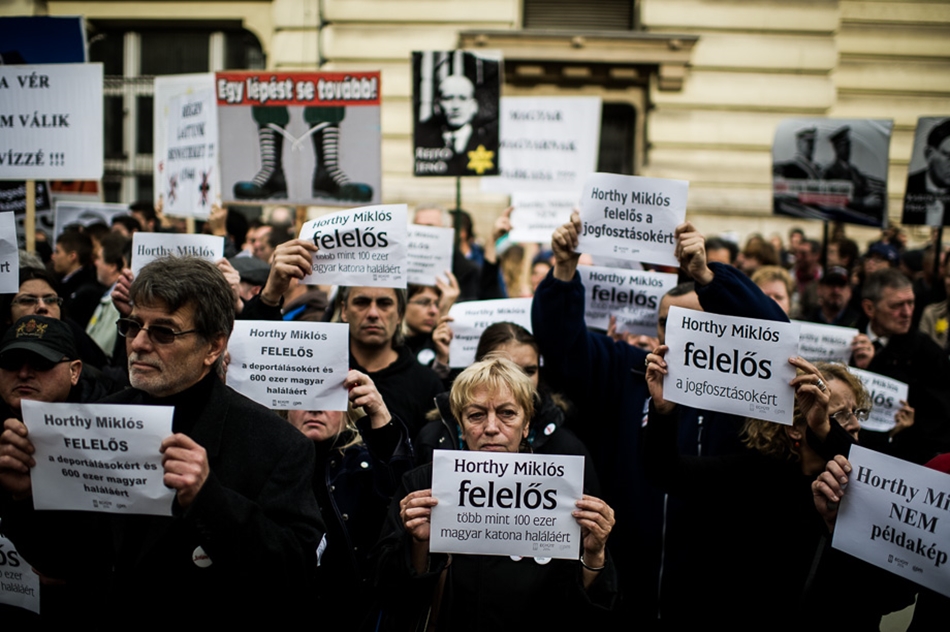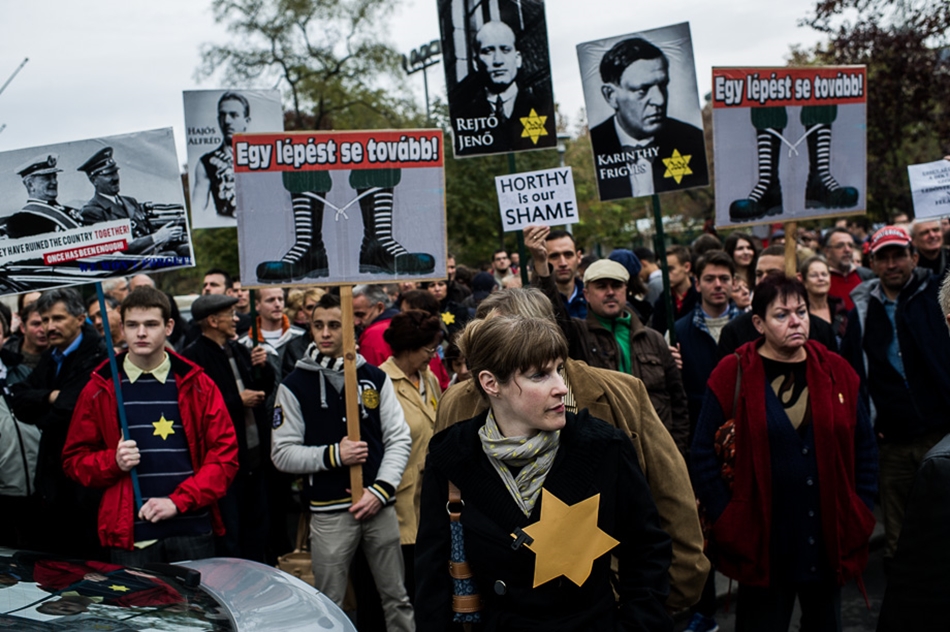Addendum: Dec. 11, 2013
A letter to The Guardian by Andras Schiff, the Hungarian-born British classical pianist:
Hungarians Must Face Their Nazi Past, Not Venerate It
Addendum: Nov. 3, 2013

– at a Horty statue dedication –

Horthy “responsible” – All photos above © Stiller Ákos
HU – ES – EN – DE – FR
From the New York Times
An Opera Fights Hungary’s Rising Anti-Semitism
Ivan Fischer’s Opera ‘The Red Heifer’ Addresses Prejudice
Published: October 20, 2013
BUDAPEST — Ivan Fischer is best known as a first-class conductor whose Budapest Festival Orchestra has entranced audiences worldwide. Last week, Mr. Fischer took on a new role — social critic — when the orchestra gave the premiere of an opera he had composed as a rebuke to what he and others see as growing tolerance for anti-Semitism in today’s Hungary.

Kyra Varga and the title character in Ivan Fischer’s opera “The Red Heifer,” about Jews wrongly accused of murder in the 19th century. Photo Gordon Eszter
Based on an infamous 19th-century case in which a group of Jews were wrongly accused in the death of a Hungarian peasant girl, Mr. Fischer’s opera, “The Red Heifer,” is a vivid display of how cultural figures have emerged as some of the most vocal critics of Hungary’s rightward and authoritarian drift under Prime Minister Viktor Orban.
At a time when the traditional left-wing political opposition is hobbled by corruption scandals and its Communist past, Mr. Fischer is among a growing group of artists challenging a government that has tested the ideals of the European Union. The others include the pianist Andras Schiff and a popular theater director, Robert Alfoldi, who was ridiculed by right-wing politicians for his homosexuality.
The tensions in Hungary come as many right-wing parties are on the rise across the Continent and cultural figures from France to Greece to Eastern Europe are starting to respond. At the same time, many former Soviet countries are wrestling with their identities, pulled between the market and social forces of the West and deeply rooted national tendencies.
But in few places are cultural figures taking as strong a part in the debate as they are in Hungary. Since coming to power in 2010, Mr. Orban’s government has changed the constitution to limit the power of the judiciary and restrict press freedom, civil liberties groups say. More troubling, the far-right Jobbik party controls about 12 percent of Parliament, with a nationalistic, anti-Semitic and anti-immigrant platform unthinkable in most of Europe.
“The Red Heifer” is based on a blood libel from 1882 that divided the country much as the Dreyfus affair later did in France. His ambitious composition uses both a full orchestra and a Gypsy band, with references to music from Klezmer to rap to Mozart. The production, featuring adults and children, is set in the 19th century but includes pointed contemporary references.
Onstage, a red papier-mâché cow stomps on the peasant girl’s foot. Another scene features lively folk dancing by the same crowd that later turns into soccer hooligans blowing vuvuzelas, waving Hungarian flags and calling for retribution against the Jews. After that, the 19th-century Hungarian statesman Lajos Kossuth arrives out of the past, singing in a deep bass-baritone: “I am ashamed by the anti-Semitic agitation; as a Hungarian, I feel repentant toward it, as a patriot, I scorn it.”
In an interview this month, Mr. Fischer said that he had long wanted to write an opera based on the case, but it was the rise of Jobbik that spurred him to action.

Tamas Altorjay in the production – Gordon Eszte
“In the last one or two years, it came up to me, and I thought, ‘Now I have to write it,’ ” Mr. Fischer said as he sat in the study of his airy home here, near a grand piano and a wall of books in many languages — an island of cosmopolitanism in a country increasingly turning inward.
“Culture shouldn’t be interested in day-to-day politics,” said Mr. Fischer, who has also been the principal conductor of the Washington National Symphony Orchestra. “We want to be valid next year and the year after. But I think culture has a strong responsibility to find the essence, the real concealed truth which lies behind the day to day.”
Today, that picture shows Mr. Orban subtly courting voters on the far right, hoping to preserve his majority in elections scheduled for next spring. This has contributed to a climate in which, as part of more generalized criticism against foreign forces — especially the European Union and the International Monetary Fund — it has become acceptable public discourse to blame Jews for the country’s economic problems. Last year, Imre Kertesz, Hungary’s Nobel Laureate novelist, compared Mr. Orban to the Pied Piper and said democracy had never fully taken root in Hungary. That same year, Mr. Schiff, a renowned pianist, stirred debate when he said he would not set foot in his native Hungary while Mr. Orban was still in power.
Mr. Fischer, who is Jewish, said he doesn’t feel the same way and is dedicated to the Budapest Festival Orchestra, which receives funds from the government. Still, he has moved his family to Berlin, commuting to remain part of the conversation in Hungary.
He was roundly condemned. Indeed, the Orban government has taken pains to separate itself from Jobbik. “There is no cooperation or partnership with Jobbik, and its support is not required for any decision in Parliament,” a government spokesman, Ferenc Kumin, wrote in an e-mail.
The rise of the far right also comes amid a significant Jewish revival in Hungary since the fall of the Berlin Wall. This month, Hungary’s deputy prime minister said in Parliament that Hungarians must accept responsibility for the Holocaust. Next year, Hungary plans to dedicate millions of dollars for programs commemorating the 70th anniversary of the deportation of Hungarian Jews.
Mr. Fischer said he welcomed the steps but wished the government would go further, “to isolate themselves from everything that the far-right does.” As part of a family-values campaign, in the past two years, Jobbik politicians have publicly ridiculed Mr. Alfoldi in Parliament for being gay. He was ousted as director of the National Theater last summer, replaced by a director closer to the government.
While Mr. Fischer is better known abroad than at home, Mr. Alfoldi has become something of a national hero. Before his ouster, Mr. Alfoldi’s productions, from revamped Hungarian classics to Tony Kushner’s “Angels in America,” had been so popular that people camped out all night for tickets. He is now starring on television in the Hungarian version of “The X-Factor,” which he said averages 2.5 million viewers in a country of 10 million.
A speech he delivered this month in Vienna about the role of culture in a democracy was widely republished and debated in the Hungarian press.

Jonathan Kovacs in “The Red Heifer.” – Gordon Eszter
In an interview here, Mr. Alfoldi touched on its themes. “I am not what the government thinks a Hungarian citizen ought to be,” he said. “According to them, a good citizen ought to be Christian, heterosexual, have more than one kid; he should not have a critical attitude and should believe in the past.”
He added: “A citizen should not ask questions either. But I think it is the job of a theater director, especially the job of the director of the National Theater, to ask questions, and to ask questions that are important for the whole society,”
Hungary has a vocal civil society. Since 2011, thousands have taken to the streets to protest the government’s changes to the constitution and its new media law. Journalists and analysts say that the changes have not stifled free speech but are a potential threat — a weapon the government could use if it decided to. The result has been self-censorship. (The government denies that the law represses free speech.)
After the performance of “The Red Heifer,” audience members debated its impact. “If 700 or 800 people see this opera, it will have no effect,” said Josef Janos. A friend, Katalin Patkos, chimed in. “We shouldn’t be so pessimistic,” she said. “It’s a contribution. How effective a contribution, that isn’t Fischer’s problem.”
This article has been revised to reflect the following corrections:
Correction: October 22, 2013 Because of an editing error, a picture caption on Monday with an article about the opera “The Red Heifer,” composed by the conductor Ivan Fischer of the Budapest Festival Orchestra as a rebuke to what he and others see as a growing tolerance of anti-Semitism in Hungary, misidentified the setting in which Mr. Fischer was shown conducting. It was a concert in Berlin earlier this year, not a performance of “The Red Heifer” in Budapest.
Correction: October 23, 2013 An article on Monday about the opera “The Red Heifer,” composed by the conductor Ivan Fischer of the Budapest Festival Orchestra as a rebuke to what he and others see as a growing tolerance of anti-Semitism in Hungary, misstated the percentage of seats the far-right Jobbik party controls in the Hungarian Parliament. While it won nearly 17 percent of the vote in the 2010 elections, it controls about 12 percent of Parliament, not nearly 20 percent.
From Haaretz
Jobbik’s menacing shadow over Hungary
When will Hungary step up to fight the anti-Semitism, racism and pernicious conspiracy theories promoted by Jobbik, the country’s third most popular political party?
By Mate Hajba | Oct. 23, 2013

Hungarian MP Balazs Lenhardt, left, formerly member of Jobbik party, burns an Israeli flag during a demonstration in Budapest, Hungary. Friday, Dec. 14, 2012. Photo by AP
One of the engines behind Hungary’s rising radicalism in recent years is the Jobbik party, often dubbed as a neo-Nazi group, and a leading force gathering together the country’s right-wing extremists. As the party has gained in popularity, attacks against minority groups have became fiercer. Jobbik, often mentioned alongside the Greek Golden Dawn Party as the two most influential radical parties in Europe, is associated with anti-Roma, homophobic, anti-EU and anti-Semitic incitement. Greece appears to be waking up – if belatedly – to the threat of Golden Dawn; but Hungary’s civil society and politicians have not yet committed to making top priority the fight against racism, racial stereotypes and obscure but influential conspiracy theories that poison relations between ethnic and cultural groups within the state.
Jobbik’s effectiveness is amplified by its excellent organizational skills and its strong, clearly-articulated set of nationalist values. Its activists are ready to respond quickly to political or social incidents; they can crowd-source many people in even remote rural areas to hold protests, and they know how to channel latent aggression, whether in the rich or poor, educated or not.
Jobbik promotes an extreme paradigm of Hungarian patriotism and its favored targets are the State of Israel, the Roma minority and the EU. By tapping into long-held hostility towards certain minorities, the party has become a dangerous nexus bringing together a range of Hungarians whose common denominator are shared racist views.
The party denies the accusations leveled both domestically and abroad of being of anti-Semitic and racist, claiming – in the case of Israel – that they only oppose Israel’s actions as a state and not the Jewish people itself. However Holocaust denial has featured in the speeches of several party members, most recently when a Jobbik MP proclaimed that the Auschwitz museum described events that “may not reflect the real facts of history.” Just last year another Jobbik MP stated in the National Assembly that the names of politicians with Jewish origins should be added to a watch-list of public figures who could pose a national security risk.
While Jobbik also denies the accusations of being intolerant towards the Roma minority, its harsh propaganda against the Roma, whom the party commonly characterizes as criminals and lazy, fill the public square.
The party established its own paramilitary organization, the Magyar Gárda (Hungarian Guard), which posed as a civilian militia. The members of this organization marched on the streets of major Hungarian towns wearing traditionalist uniforms and fascist-era armbands – an action with frightening parallels to the 1930’s and 1940’s. After two years of operations the organization was banned, but immediately after that a new group was formed, calling themselves the New Hungarian Guard.
One of the most infamous actions of the Hungarian Guard alongside with Jobbik was at a village that has a 20% Roma minority. The radicals claimed that there was a ‘Roma-terror’ in the country and that Roma committed ‘gypsy crimes’. While Jobbik representatives held speeches in the village, approximately 2000 nationalist activists marched through the Roma area in order to intimidate them.
The two tropes against Jews and the Roma can sometimes be married together. This year when the World Jewish Congress took place in Budapest, party members protested against the event, claiming that Jewish people were planning to ‘buy’ Hungary. This and similar conspiracy theories are becoming quite popular amongst the growing numbers of Hungarian radicals. One extrapolation of this theory holds that the Roma people are controlled by the Jews; while the Roma are committing crimes, Hungarian society is being diverted from the real problem: The ‘Israelis’ who are coming to conquer Hungary through financial investment, leaving the Hungarians people as a people to be colonized by Zionism.
In contrast to many typical supporters of right-wing radical parties abroad, Jobbik supporters do not coming from low-income areas with little education. The party is in fact more popular amongst those with above-average income. This is due to Hungary’s difficult economic situation: Those with some wealth have more to lose than those without, and thus embrace more easily the nationalist rhetoric that could ‘save’ them. This is part of the reason that, according to current polls, Jobbik has become the third most popular party in Hungary.
The other parties, populist in nature, are more concerned with fighting each other than treating the Jobbik problem with the seriousness it deserves. However, members of the major parties did step up against Jobbik over the suggestion of listing Jewish politicians. This anti-Semitic initiative resembled too closely legislation from the dark era of the Holocaust and served as a wake-up call for many Hungarian politicians.
But this limited reaction is not sufficient to tackle the problem of the rise of neo-fascism in Hungary. A more open social dialogue is needed to address the issue. Hungarians should shun the errors of communist times, during which the problems of racism and intimidation were swept under the rug.
Far-right radicals like to taunt those who oppose them to go to areas where minorities live to gain a firsthand experience of how they abuse Hungarians and commit crimes. But it is the radicals who should leave their ivory towers of prejudice and face reality. Many of the difficulties cited about the Roma are caused by poverty: Stronger efforts by civil society to integrate the Roma more would allow young Roma especially to get proper education and thus make their way out of poverty.
Fighting fascist populism can only come through encouraging a barely-existing dialogue between minority and majority groups in Hungary, to humanize those being demonized. The mainstream media also has an important role – to step up and actively debunk the racist and anti-Semitic conspiracy theories that are disseminated by Jobbik.
There should be no underestimating how dire the situation is. The infamous slogan of the Jobbik party looms over Hungary like a menacing shadow: “God grant us a brighter future.” The question is: What they mean by “us”?
Máté Hajba is a Young Voices Advocate and blogger from Budapest, where he is studying law. He is also the program director and youth coordinator at a Hungarian economics think tank and vice director at Polgári Platform, a Hungarian organization that promotes democratic value, and aims to strengthen political engagement and pluralism.
Also from Haaretz
Former anti-Semitic Hungarian leader now keeps Shabbat
Last year, Csanad Szegedi, former no. 2 of far-right Jobbik party, called on Hungary to protect itself from Jews. Then he learned he had Jewish roots and has become enamored with Judaism ever since.
By Ofer Aderet | Oct. 21, 2013 ![]()

Members of Members of Jobbik, a Hungarian far-right party, attending the inauguration ceremony of the ‘Hungarian Guard’ in Budapest, August 25, 2007. Photo by Reuters
A year ago he was still arguing that Hungary had to protect itself from the Jews. He was an anti-Semite of the most extreme kind and a senior official in his country’s far-right Jobbik party. The fiery extremist, Csanad Szegedi, even appeared in the black uniform of the Hungarian Guard, the militia group that he founded, at an opening session of the European Parliament. And then, last year, he suddenly discovered he has Jewish roots.“It will take me some time to digest this information,” he said at first. “What is important is not [needing to] know who is a purebred Hungarian, but who protests like a Hungarian. From my standpoint, being Hungarian means demonstrating responsibility for the homeland,” he explained.
But over the past year it turns out that this anti-Semitic fascist leader has become enamored with Judaism. In a report that appeared over the weekend in the German newspaper Welt am Sonntag, it was disclosed that Szegedi has decided to live as a practicing Jew. He observes Shabbat, attends synagogue, is studying Hebrew and is even trying to familiarize himself with the Talmud, the code of Jewish law. “He is attempting to observe the 613 commandments,” the newspaper said, referring to the basic obligations of an Orthodox Jew. But Szegedi admitted that he was not always successful at this. “Kosher cuisine – without pork, salami and the other things that Hungarian cuisine is based upon. It will take me time to wean myself from them,” the former right-wing leader acknowledged.
The transformation that Szegedi has undergone is just about as radical and wild as some of the views he expressed at the European Parliament. “This budget proposal reads like a document written by [Israeli President] Shimon Peres,” he once stated. “[It’s] a budget that will make the Hungarians poorer and the rich Jews richer.” And he accused what he called “the Jewish intelligentsia” of doing harm to the “holy throne” of St. Stephen, Hungary’s first king, who is considered the founder of the Hungarian state and the spiritual authority for all the rulers who followed.
Szegedi’s popularity began to put off his adversaries and political competitors, who began to look for dirt on the rising right-wing leader. Ultimately they found it. It turns out that his grandmother on his mother’s side is a Jewish survivor of the Auschwitz concentration camp and his maternal grandfather was also Jewish and was interned in a labor camp. In fact, half of his family perished at Auschwitz.
In investigating further, Szegedi discovered that his grandfather had a previous wife and together they had two children. The wife and children all died at Auschwitz. After the war, the grandfather married Szegedi’s grandmother, a Jewish survivor of Auschwitz. The couple were married in an ultra-Orthodox wedding ceremony but several years later distanced themselves from religion. His grandmother chose not to speak about her past, although when Szegedi’s mother was 14, his grandfather disclosed the family’s Jewish past to her. But he warned, however, her not to reveal it to anyone out of concern that there would be “another Auschwitz.” The grandfather was said to be very pleased when Szegedi’s mother married a non-Jew “as protection,” he explained.
Now, however, the former fascist anti-Semite acknowledges his past failings. “I hurt other people. When I spoke disparagingly of Jews or Gypsies [or Roma, as they prefer to be called], I was also harming children who had never done anything wrong and may have talents that they could develop, but I blocked their path,” he conceded. “You start hating until the hate becomes an aim unto itself…. At the beginning, it was ‘the crimes of the Gypsies.’ Then it was anti-Semitism, and then we also started hating Romanians and Slovaks, because they had persecuted the Hungarian minority [in their countries]. Ultimately you hate the whole world and most of [the world’s] peoples because they have not met your standards.”
The disclosure of his Jewish background distanced Szegedi from many of his friends. “All of a sudden, people who I thought were my friends stopped being friends,” he recounted, and from his position as No. 2 in the Jobbik party, he became the party’s No. 1 problem, Welt am Sonntag, the German newspaper, noted. Even his friends in the party did him no favors. “The best thing would be if we shoot you so you can be buried as pure Hungarian,” one told him. Another suggested that he deliver a public apology. “And then,” Szegedi said, “I thought, wait a minute, I am supposed to apologize for the fact that my family was killed at Auschwitz?”
He quit the Jobbik party and began searching for his roots. He spoke to his mother and grandmother. He had discussions with rabbis and developed a relationship with rabbis from the Chabad Hasidic outreach movement. He even made a visit to Jerusalem with them to the Yad Vashem Holocaust memorial museum and the Western Wall.
Nonetheless, in choosing to describe him, Welt am Sonntag gave the article about Szegedi the headline “Not entirely kosher.”
From the New York Times
In Hungary, Anti-Semitism Rises Again
By MARIANNE SZEGEDY-MASZAK
Published: October 29, 2013
ARLINGTON, Virginia — My father, Aladar Szegedy-Maszak, a Hungarian diplomat, dined with Adolf Hitler three times.
Related in News
-
An Opera Fights Hungary’s Rising Anti-Semitism (October 21, 2013)
And then he went to the concentration camp at Dachau.
As secretary to the Hungarian ambassador to Germany from 1932 to 1937, my father watched the rise of the Führer. He encountered him socially at a reception and two dinners — the first time on Feb. 10, 1933, at Hitler’s first speech as chancellor. He remembered how sweat poured from Hitler’s face, soaking his uniform. The speech left my father cold, but also deeply unsettled by the rhapsodic reactions of the audience. “This was my first personal experience that we were dealing with a quasi-religious mass movement,” he wrote, “or perhaps more accurately, a mass psychosis.”
My father knew how devastating Nazi rule would be for the Jews. Hungarian Jews came to his office in droves, imploring him for advice as to how they could help themselves as property was seized and small businesses destroyed.
He met movie directors and actresses; small-business owners; a landlord who owned a block of houses in a workingmen’s neighborhood of Berlin who was told that if he didn’t leave, he would be charged with molesting women. There was nothing he could do.
The hardy perennial of anti-Semitism has made a dramatic comeback in Central Europe. Germany has recently reiterated its friendship with Israel, in response to recent anti-Jewish activity. Far-right political parties in France and Austria have gained force. In Hungary, a virulently anti-Semitic party, Jobbik, is now the third-largest in Parliament. One party official has called for a list of all Jewish legislators, to assess their loyalty — a move that even the right-wing government condemned. (Earlier this month, the government pledged, in the face of global criticism, to crack down on anti-Semitism.)
This all would have been troubling yet familiar to my father and other relatives of his generation. They came of age in a country that was a stew of anti-Semitism. After World War I, Communists ruled for more than four months, and since most of those in power were Jews, the link between Communism and Judaism was forged in many minds. For many Hungarians, to be anti-Communist meant being anti-Semitic.
My father was not a convinced anti-Semite, but as a Hungarian Christian from a strong family tradition of support for the monarchy, he flirted with anti-Semitism as a young man — a fact he was ashamed of his entire life. The experiences in Berlin, he wrote, “extinguished the last, minimal remnants of anti-Semitism that I had had as a teenager during the counterrevolution.” His years in Berlin, and his two other encounters with Hitler, were antidotes to any vestiges of anti-Semitism he had once harbored.
At a diplomatic reception in September 1934 before the Nuremberg rally that Leni Riefenstahl famously memorialized in “Triumph of the Will,” my father could not reconcile the old-fashioned, modest, almost shy Hitler with the raving lunatic he had seen at rallies.
The final time he met Hitler was June 7, 1942. The prime minister of Hungary was invited on an official visit to the Führer’s wartime headquarters in East Prussia and asked my father — now deputy head of the political division in the Foreign Ministry — to go with him. They ate in Hitler’s dining car and my father saw what he later referred to as “the Satanic nature of his character.”
Hungary was an ally of Germany, but an extremely unreliable one. Its officials refused to deport Jews to concentration camps. My father, known for his opposition to Nazism, had attempted to organize an effort to negotiate a separate peace with the Allies, an effort that failed and led to his arrest after the Germans invaded Hungary, on March 19, 1944.
After a regime of Hungarian Nazis took over in October 1944, voices of moderation were jailed or killed. Some 440,000 Jews were deported. Members of the gendarmerie were enthusiastic participants in the process. Ultimately some 600,000 Hungarian Jews were murdered.
If anti-Communism represented one side of hatred for Jews, anticapitalism represented another. My mother’s family, the highly assimilated children and grandchildren of the Hungarian Jewish industrialist Manfred Weiss, fell into the latter category.
My maternal grandfather was transported to the Mauthausen concentration camp in Austria after the invasion of Hungary, but he was lucky. He and his family were granted safe passage to Portugal after making, in effect, a deal with Heinrich Himmler for freedom in exchange for their property.
Before this deal was made, my maternal grandmother had disguised herself as a Hungarian peasant during the Nazi occupation. She met the wife of the anti-Semitic former prime minister (and Nazi collaborator) Bela Imredy, with whom my mother’s family had once socialized (albeit not with great closeness). My grandmother asked if there was anything Mrs. Imredy could do to save my grandfather. Mrs. Imredy replied that she couldn’t. And as they parted she turned and said, ominously and elliptically, “Now it’s our turn.”
My parents married at the end of 1945, after my father was liberated at the war’s end. He later became the Hungarian ambassador to the United States. He resigned in 1947, after the Communist takeover. He and my mother managed to remain in America. My father died in 1988, my mother in 2002.
I wonder what they would make of Hungary today. The same stereotypes of the past — the association of Jews with Communism and capitalism — fuel the support for Jobbik today.
Into this caldron has stepped the great conductor Ivan Fischer, himself a Hungarian Jew. He recently composed and performed an opera entitled “Red Heifer” that chronicles the story of a small group of Jews in the 19th century who were wrongly accused of the murder of a Hungarian girl from the countryside. It is a true story, one that uses the distant past to illuminate a dark time in the present.
Of course it is unlikely to change any minds. But the simple fact of it is an affirmation of the power of art to accomplish what decent politicians cannot. It is also an example the terrible persistence of a state of mind, a kind of psychopathy that did not begin with Hitler and, tragically, did not end with him.
Marianne Szegedy-Maszak, a journalist, is the author of “I Kiss Your Hands Many Times: Hearts, Souls, and Wars in Hungary.”






 Laure Adler & Ses Invités/Ses sujets
Laure Adler & Ses Invités/Ses sujets MEMRI
MEMRI![Magazine d’Actualité Internationale [abonnez-vous aux podcasts!] Arte Reportage Magazine d’Actualité Internationale [abonnez-vous aux podcasts!]](https://www.arte.tv/i18n/3838018,property=data,v=1.png) Arte Reportage
Arte Reportage Frontline
Frontline Independent Lens
Independent Lens